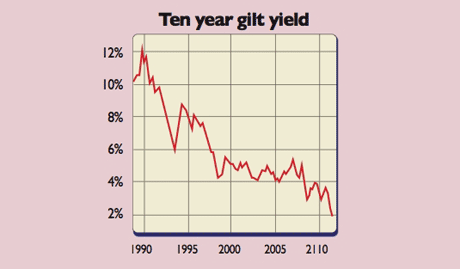These index-linked gilts look too expensive
On the face of it, buying index-linked exchange-traded funds to insure against a revival of inflation seems sensible. But this particular fund is too expensive for a number of reasons, says Paul Amery.

Get the latest financial news, insights and expert analysis from our award-winning MoneyWeek team, to help you understand what really matters when it comes to your finances.
You are now subscribed
Your newsletter sign-up was successful
Want to add more newsletters?

Twice daily
MoneyWeek
Get the latest financial news, insights and expert analysis from our award-winning MoneyWeek team, to help you understand what really matters when it comes to your finances.

Four times a week
Look After My Bills
Sign up to our free money-saving newsletter, filled with the latest news and expert advice to help you find the best tips and deals for managing your bills. Start saving today!
On the face of it, buying index-linked exchange-traded funds (ETF) to insure against a revival of inflation seems sensible. After all, the retail prices index (RPI), which index-linked gilts track, is rising at more than 5% a year, way above the Bank of England's base rate of 0.5%. And the consumer price index (CPI) measure of inflation has overshot the Bank's 2% target in 17 of the last 24 months.
But we'd advise against buying the iShares Barclays Capital £ index-linked gilt ETF (LSE: INXG) at current price levels, for four reasons. Firstly, index-linked gilts are only guaranteed to give you an above-inflation return if you hold them to maturity. For shorter-maturity bonds, this may not be a problem. But if you buy longer-dated 'linkers' and half INXG's assets are in bonds with more than 15 years to maturity the price will rise and fall in the interim based on movements in so-called real yields.
And with real yields for long-maturity index-linked bonds driven to extreme lows by high pension fund demand, you'd be buying them at very expensive levels barely enough in yield terms, in fact, to cover the risk of sovereign default. If real yields were to return to the 4%-plus levels seen in the mid-1990s, any investor in long index-linked gilts would take heavy losses.
MoneyWeek
Subscribe to MoneyWeek today and get your first six magazine issues absolutely FREE

Sign up to Money Morning
Don't miss the latest investment and personal finances news, market analysis, plus money-saving tips with our free twice-daily newsletter
Don't miss the latest investment and personal finances news, market analysis, plus money-saving tips with our free twice-daily newsletter
Second, it's quite likely that the recent spike in UK inflation marks a short-term peak. A renewed fall in house prices, stagnant wages, huge industrial overcapacity none of this presages a real acceleration in inflation. And if Britain were to tip over into deflation, as seems very likely in parts of continental Europe, you'd want to hold conventional (fixed-rate) government bonds, not index-linked ones.
Third, there are more attractive inflation-linked bond markets elsewhere. Real yields in the US, Canada, and even Japan, among others, all offer better value than the UK. Even if it means taking some currency risk, it's worth considering a diversified index-linked bond fund, such as the iShares Barclays Capital global inflation-linked bond fund (LSE: IUS5), rather than the UK-focused INXG.
Lastly, consider the alternatives. For inflation protection if you believe prices are really about to take off gold, silver and certain equity ETF sectors (hard assets, utilities, for example) may provide a more cost-effective route to securing your savings' purchasing power.
Paul Amery edits www.indexuniverse.eu
Get the latest financial news, insights and expert analysis from our award-winning MoneyWeek team, to help you understand what really matters when it comes to your finances.
Paul is a multi-award-winning journalist, currently an editor at New Money Review. He has contributed an array of money titles such as MoneyWeek, Financial Times, Financial News, The Times, Investment and Thomson Reuters. Paul is certified in investment management by CFA UK and he can speak more than five languages including English, French, Russian and Ukrainian. On MoneyWeek, Paul writes about funds such as ETFs and the stock market.
-
 How a ‘great view’ from your home can boost its value by 35%
How a ‘great view’ from your home can boost its value by 35%A house that comes with a picturesque backdrop could add tens of thousands of pounds to its asking price – but how does each region compare?
-
 What is a care fees annuity and how much does it cost?
What is a care fees annuity and how much does it cost?How we will be cared for in our later years – and how much we are willing to pay for it – are conversations best had as early as possible. One option to cover the cost is a care fees annuity. We look at the pros and cons.
-
 FCA greenlights the first Long Term Asset Fund
FCA greenlights the first Long Term Asset FundNews City watchdog authorises the first Long Term Asset Fund - we explain what they are and how investors can use them.
-
 2022: what doesn’t kill you makes you stronger
2022: what doesn’t kill you makes you strongerAdvertisement Feature Ben Ritchie and Rebecca Maclean, Investment Managers, Dunedin Income Growth Investment Trust PLC
-
 Seize these investment trust bargains in 2022
Seize these investment trust bargains in 2022Tips Attractive investment trusts are trading at a discount, and those waiting for the perfect time to buy will miss out. Max King picks a selection of the best investment trusts to buy for 2022.
-
 The best way to short gilts
The best way to short giltsFeatures Economic recovery spells falling government bond - or 'gilt' - yields as investors are prepared to take greater risks again. But how do you short a falling gilt yield? Tim Bennett explains.
